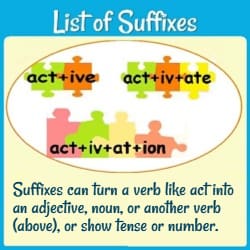Negative Prefix List: the Top 6
What's the difference between dis- and mis- or between un- and non-? This negative prefix list can help you understand these prefixes that can change a word's meaning into its opposite.
Note: I have added the parts of speech (verb, adjective, noun) to the prefix list examples. That's because some people are looking for negative adjectives or negative verbs.
Go straight to the examples:
- dis-
- in- (or il-, im-, or ir-)
- mis-
- un-
Negative Prefix List: Uses
- De- is almost always used before a verb, or a word formed from that verb. It means to reverse the verb’s action, as in dehydrate, deregulate, or detoxify. (It can have other meanings besides making a verb negative. For example, it means 'down' in decline, decrease, and depression.)
- Dis- can be used with verbs, nouns, adjectives or adverbs. It also has other meanings besides making words negative.
- In-, non-, and un- are usually used for nouns, adjectives, or the adverbs formed from them (though un- is also used for verbs.) They all mean not _____. (In- is the negative prefix in Latin. non- means 'not' in Latin, and many words using it as a prefix came into English via French. Un- comes from Old English.)
- Mis- is from Old English, or in some words from French. It's used with verbs (and adjectives and adverbs made from them), as well as nouns. It means bad, wrong, or wrongly.
- Non- usually means not, but also may mean lack of something.
- Un- is the most common negative prefix in English. If in doubt, it's the best one to try. Un- is the negative prefix even for many words from Latin roots.
Important: sometimes an adjective uses one prefix and related nouns or verbs use different ones.
For example:
- unable, inability, (to) disable;
- unbalanced, imbalance, (to) unbalance;
- unstable, instability, (to) destabilize.
- To deactivate is to make something inactive.
Usually, however, the same prefix serves both adjective and noun. Examples: uncertain, uncertainty; unwilling, unwillingness; unfriendly, unfriendliness, inadequate, inadequacy, disloyal, disloyalty, etc.
Negative Prefix Examples:
1. De-
Examples: deactivate, decode, decommission, decompose, deconstruct, decontaminate, deflate, deflect, deform, demythologize, derail, detract.
The list above is all verbs. We can make any of them into adjectives by adding -ed (or -d if the verb ends in 'e' already: decoded, deflated, etc.) Several can also become nouns: deactivation, decomposition, decontamination, deflation, etc. Decrease is already a noun (or a verb.)
Note that the prefix de- in Latin (and in words that originate in Latin) has other, contrary meanings as well as sometimes making words negative. (See List of Prefixes.)
It is often used as an intensifier, meaning completely (as in demand), as well as meaning from, down, or away. When used with an English verb to make a new word, it works as a negative. (Debug, defrost, devalue.)
2. Dis-

Examples (verb/ adjective/ noun or vb/ adj when all are common):
disaffected (adj.), disagree/ disagreeable/ disagreement, disbelief (noun), dishonor (vb. or noun)/ dishonored or dishonorable, disinfect/ disinfected/ disinfection, disinherit/ disinherited, disloyal (adj.) & disloyalty (noun), displease/ displeased or displeasing/ displeasure, disproportionate (adj.), distasteful (adj.) and distaste (noun), distrust (vb. or noun)/ distrustful (adj.).
(Tasteful refers to something that shows good taste or judgment. Things which are pleasant to the taste buds are ‘tasty.’ Distasteful refers to tasks that are unpleasant. Foods that lack flavor are tasteless. A lack of good taste in aesthetics can also be called tasteless.)
3. In- (or il-, im-, or ir-)
In- often changes to 'il-' before l; 'im-' before b, m, or p; and 'ir-' before r. These changes make it easier to pronounce.
Adjective examples:
illegal, illegible, illiterate, illogical, immature, impatient, imperfect, impossible, imprecise, inaccessible, inaccurate, inadequate, inappropriate, incapable, incoherent, incompatible, incomplete, inconceivable, inconsistent, incredible, indefinite, indiscreet, inevitable, infinite, inflexible, insecure, insignificant, insubordinate, insufficient, invalid, invariable, invisible, involuntary, irrational, irregular, irrelevant, irreparable, irresistible, irresponsible, irreversible, etc.
A few noun examples using the same roots:
illegibility, illiteracy, immaturity, impatience, imperfection, impossibility, imprecision, inaccessibility, inaccuracy, inadequacy, inappropriateness, incapability, incoherence, incompatibility, incompleteness, inconsistency, indiscretion, inevitability, infinity, inflexibility, insecurity, insignificance, insubordination, insufficiency, invalidity, invariability, invisibility, irrationality, irregularity, irrelevance, irresponsibility.
Most of these do not have verb forms.
Notice these exceptions in which ‘in-‘ does not negate, but intensifies:
Inflammable has the same meaning as flammable-- something that burns easily. Their opposite is nonflammable. The same is true for habitable and inhabitable. (The negative is uninhabitable).
Valuable and invaluable also are synonyms— except that invaluable is even stronger. It means something is priceless: so valuable that a person would not want to give it up for any amount of money.
4. Mis-
Examples: misconduct (noun), misdemeanor(noun), misdiagnose (to diagnose wrongly-vb.)/ misdiagnosed/ misdiagnosis, misinform/ misinformed/ misinformation, misinterpret/ misinterpreted/ misinterpretation, mislead/ misled or misleading, misplace/ misplaced, misspell/ misspelled/ misspelling, mistake/ mistaken/ mistake, mistrust (both a noun and a verb, but weaker than distrust), misunderstand/ misunderstood/ misunderstanding.
A misdiagnosed disease has been diagnosed incorrectly. Compare that to an undiagnosed disease, which has not been diagnosed at all.
In the same way, a misinformed person has received wrong information. An uninformed person simply does not know much about a subject.
See Voice of America's Learning English for the difference between 'misinformation' and 'disinformation.'
(They both refer to information that is not true. They differ because the purpose of disinformation is to deceive. People who share misinformation may not realize it's false.)
You can also listen to an audio version of the article and find definitions of all its key words.
5. Non-
Examples-- nouns: nonconformist or nonconformity, nonentity, nonexistence, nonintervention, nonsense, etc.
Adjectives: nonconforming, nonexistent, nonmetallic, nonpartisan, nonresident, nonrestrictive (but unrestricted), nonsensical, nonstop.
I can't think of any verbs that begin with non-.
Some words can be negated either with non- or with another negative. In those cases non- has a more neutral connotation. For example, nonstandard means not according to the usual standard. In contrast, substandard means below the standard: not good. Nonreligious means not religious, but irreligious means more actively opposed to religion.
6. Un-
(Adjective) Examples: unable, unacknowledged, unaffected (not affected at all; disaffected means affected badly), unafraid, unaided, unaltered, unambiguous, unanticipated, unapproachable, unassigned, unattainable, unavailable, unaware, unceasing, uncertain, unclear, unconventional, uncooperative, uncoordinated, unenforced, unexposed, unfocused, unfriendly*, unhelpful, uninformed, unknown, unmodified, unnatural, unpleasant, unpredictable, unprofessional, unrealistic, unrefined, unresolved, unscheduled, unstable, untouched, unwilling, etc.
*(in this case -ly isn’t for an adverb. Both friendly & unfriendly are adjectives.)
A few of these have related nouns including unavailability, uncertainty, unenforceability, unpleasantness, unpredictability, unreality, and untouchability, as well as inability, instability, and irresolution.
Some also have related adverbs: unambiguously, unceasingly, uncertainly, unconventionally, unnaturally, unpleasantly, unpredictably, unprofessionally, unrealistically, unwillingly, and possibly others.
Very few are verbs: undo and (only informally, on Facebook) unfriend.
There are many more examples of negative prefixes on 50 Word Roots. (You can make almost any adjective negative with ‘un-’ except the negatives that we carried over from Latin with ‘in-‘ (or ‘il-‘, ‘im-‘ or ’ir-‘. Remember that these 'in-' prefixes can also mean ‘in’ or ‘into.’)
I counted the different negative prefix uses there—all useful words that I have read and might use. None of these Latin roots took the prefix ‘mis-.‘ Four (nouns and adjectives) took ‘non-,‘ 13 took ‘de-‘; 9 ‘dis-‘ 22 ‘in-‘’im-‘, etc. Well over 30 (not all written down) took ‘un-.’
Other prefixes, besides the 6 on this negative prefix list, can also give a negative connotation to words. (Note 'sub-' above.) A- an-, anti-, contra- counter-, and ob- also often negate the meaning of a root.
See List of Prefixes for each of these. See also the Facebook Comments below for a-: amoral-- not moral, etc.
The six prefixes at the top of this page are the most common in English, though. They are worth knowing!
The best way to learn the different negative prefixes is to work (or play) with them. You can do both on Practice Negative Prefixes. It emphasizes academic vocabulary, so you can review about 60 common words from the Academic Word List there.
You can also see how some of these negative prefixes (de-, in-, and un- ) are used in Word Families, Word Family Practice, and Word Formation Examples & Exercises.
More Related Pages:
Knowing these common prefixes (& a few roots) will make hundreds of English words easier!
Use this list of suffixes (with examples) to build your vocabulary.
Knowing a few roots & prefixes can help you figure out meanings of new words.
If you teach English, be sure to check out Root, Prefix, and Suffix Worksheets.
The Common Prefix packet contains printable pdf lessons with all the information from this page, the List of Prefixes, and a great deal of practice (with negative prefixes as well as all the most common prefixes). There are also root, suffix, and combination packets.
Didn't find what you
needed? Explain what you want in the search box below.
(For example, cognates, past tense practice, or 'get along with.') Click to see the related pages on EnglishHints.
| site search by freefind | advanced |












